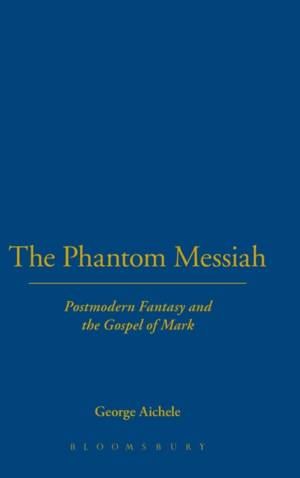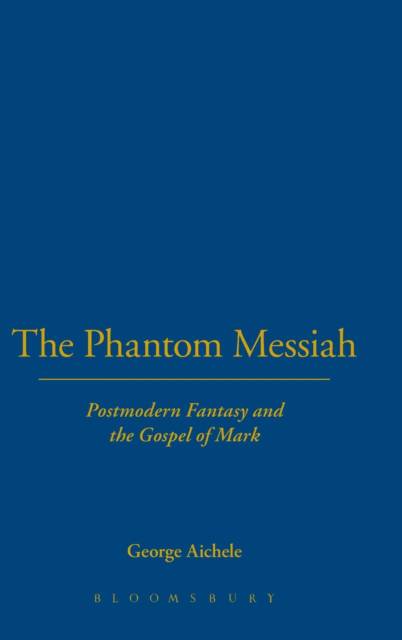
- Retrait gratuit dans votre magasin Club
- 7.000.000 titres dans notre catalogue
- Payer en toute sécurité
- Toujours un magasin près de chez vous
- Retrait gratuit dans votre magasin Club
- 7.000.0000 titres dans notre catalogue
- Payer en toute sécurité
- Toujours un magasin près de chez vous
339,45 €
+ 678 points
Description
[W]hen they saw him walking on the sea they thought it was a ghost (phantasma), and cried out; for they all saw him, and were terrified (Mark 6:49, RSV)
There
is a growing awareness among biblical scholars and others of the
potential value of modern and postmodern fantasy theory for the study
of biblical texts. Following
theorists such as Roland Barthes, Tzvetan Todorov, and Gilles Deleuze
(among others), we understand the fantastic as the deconstruction of
literary realism. The fantastic arises from the text's resistance to
understanding; the "meaning" of the fantastic text is not its reference
to the primary world of consensus reality but rather a fundamental
undecidability of reference. The fantastic is also a point at which
ancient and contemporary texts (including books, movies, and TV shows)
resonate with one another, sometimes in surprising ways, and this
resonance plays a large part in my argument. Mark and its afterlives
"translate" one another, in the sense that Walter Benjamin speaks of
the tangential point at which the original text and its translation
touch one another, not a transfer of understood meaning but rather a
point at which what Benjamin called "pure language" becomes apparent.
Mark has always
been the most "difficult" of the canonical gospels, the one that
requires the greatest amount of hermeneutical gymnastics from its
commentators. Its beginning in media res, its disconcerting
ending at 16:8, its multiple endings, the "messianic secret," Jesus's
tensions with his disciples and family - these are just some of the
more obvious of the and many troublesome features that distinguish Mark
from the other biblical gospels. If there had not been two other
gospels (Matthew and Luke) that were clearly similar to Mark but also
much more attractive to Christian belief, it seems likely that Mark,
like the gospels of Thomas and Peter, would not have been accepted into
the canon. Reading Mark as fantasy does not "solve" any of these
problems, but it does place them in a very different context, one in
which they are no longer "problems," but in which there are different
problems. A fantastical reading of the gospel of
Mark is not the only correct understanding of this text, but rather one
possibility that may have considerable appeal and value in the
contemporary world.
This fantastic
reading is a "reading from the outside," inspired by the parable
"theory" of Isaiah 6:9-10 and Mark 4:11-12: "for those outside
everything is in parables; so that they may indeed see but not
perceive, and may indeed hear but not understand." Reading
from the outside counters a widespread belief that only those within
the faith community can properly understand the scriptures. It is the
"stupid" reading of those who do not share institutionalized
understandings passed down through catechisms and creeds, i.e., through
the dominant ideology of the churches.
There
is a growing awareness among biblical scholars and others of the
potential value of modern and postmodern fantasy theory for the study
of biblical texts. Following
theorists such as Roland Barthes, Tzvetan Todorov, and Gilles Deleuze
(among others), we understand the fantastic as the deconstruction of
literary realism. The fantastic arises from the text's resistance to
understanding; the "meaning" of the fantastic text is not its reference
to the primary world of consensus reality but rather a fundamental
undecidability of reference. The fantastic is also a point at which
ancient and contemporary texts (including books, movies, and TV shows)
resonate with one another, sometimes in surprising ways, and this
resonance plays a large part in my argument. Mark and its afterlives
"translate" one another, in the sense that Walter Benjamin speaks of
the tangential point at which the original text and its translation
touch one another, not a transfer of understood meaning but rather a
point at which what Benjamin called "pure language" becomes apparent.
Mark has always
been the most "difficult" of the canonical gospels, the one that
requires the greatest amount of hermeneutical gymnastics from its
commentators. Its beginning in media res, its disconcerting
ending at 16:8, its multiple endings, the "messianic secret," Jesus's
tensions with his disciples and family - these are just some of the
more obvious of the and many troublesome features that distinguish Mark
from the other biblical gospels. If there had not been two other
gospels (Matthew and Luke) that were clearly similar to Mark but also
much more attractive to Christian belief, it seems likely that Mark,
like the gospels of Thomas and Peter, would not have been accepted into
the canon. Reading Mark as fantasy does not "solve" any of these
problems, but it does place them in a very different context, one in
which they are no longer "problems," but in which there are different
problems. A fantastical reading of the gospel of
Mark is not the only correct understanding of this text, but rather one
possibility that may have considerable appeal and value in the
contemporary world.
This fantastic
reading is a "reading from the outside," inspired by the parable
"theory" of Isaiah 6:9-10 and Mark 4:11-12: "for those outside
everything is in parables; so that they may indeed see but not
perceive, and may indeed hear but not understand." Reading
from the outside counters a widespread belief that only those within
the faith community can properly understand the scriptures. It is the
"stupid" reading of those who do not share institutionalized
understandings passed down through catechisms and creeds, i.e., through
the dominant ideology of the churches.
Spécifications
Parties prenantes
- Auteur(s) :
- Editeur:
Contenu
- Nombre de pages :
- 272
- Langue:
- Anglais
Caractéristiques
- EAN:
- 9780567025814
- Date de parution :
- 15-12-06
- Format:
- Livre relié
- Format numérique:
- Genaaid
- Dimensions :
- 152 mm x 229 mm
- Poids :
- 526 g

Les avis
Nous publions uniquement les avis qui respectent les conditions requises. Consultez nos conditions pour les avis.






